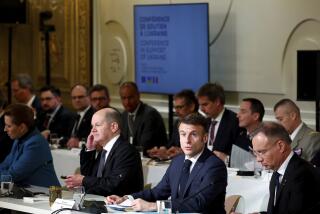NATO Tries Again, Fails Again to Map Bosnia Plan : Balkans: Leaders mull proposal to send 6,000 troops to help relief effort. But they defer action until London talks on crisis end.
- Share via
BRUSSELS — For the second time in two weeks, NATO leaders failed Tuesday to agree on a formula for providing military support for relief shipments to the strife-torn former Yugoslav republic of Bosnia-Herzegovina.
Ambassadors from the United States and the 15 other NATO nations considered a proposal to commit 6,000 troops to the relief effort, but they deferred action until after the three-day international conference on Yugoslavia that begins today in London.
Elsewhere on the eve of the London conference:
* Lord Carrington, a British diplomat and former NATO secretary general, resigned after a frustrating 11 months as chairman of the European Community’s peace conference on Yugoslavia.
* The U.N. General Assembly adopted a non-binding resolution urging the Security Council to take tougher action against Serbia, the Yugoslav republic that is widely regarded as the aggressor in the recent violence. Many Muslim nations, expressing support for the Muslim plurality in Bosnia, had urged even harsher action.
* Ethnic Serbs ringing the Bosnian capital of Sarajevo blasted the presidential palace and military headquarters with rockets and mortar fire. Authorities reported 93 people killed in Bosnia on Monday in one of the bloodiest days since the nation’s Muslims and Croats declared their independence from Serbia in February.
Failure by the North Atlantic Treaty Organization to act Tuesday reflected both the enormous potential dangers of conducting military activities in the midst of the Bosnian civil war and the concern felt by some NATO members that the alliance should not act before the London conference.
On Aug. 14, one day after the U.N. Security Council authorized the use of force if necessary to protect relief shipments to Bosnia, NATO ambassadors rejected a plan by its military staff to dispatch as many as 100,000 troops to secure a land corridor from the Adriatic Sea to Sarajevo, about 100 miles inland.
Back to the drawing board, the staff developed a much more modest option: the assignment of 6,000 troops to accompany relief convoys. Under the “light option,” as the staff called it, the NATO troops would operate “under U.N. command and rules of engagement.”
But NATO ambassadors Tuesday deferred action on this approach as well. “It was decided to return to the subject after the London conference,” a NATO spokesman said. Other sources said Germany and France were reluctant to act.
The spokesman said several of the allies had announced a willingness to contribute to an international force. He named no nations, but Britain has pledged 1,800 troops, and Italy, Spain and Turkey have also said they would contribute. France has offered 1,100 troops for use by the nine-nation Western European Union.
Carrington’s resignation as chairman of the EC’s Yugoslav peace conference will deprive the international peacemaking effort of the diplomat who once oversaw the difficult negotiations leading to Rhodesia’s independence as the nation of Zimbabwe.
“I have decided that after a year’s intensive association with the peace conference I can no longer devote to it the full-time effort which will be necessary and will extend over a considerable period,” said Carrington, 73.
Carrington negotiated a succession of brief cease-fires as Serbian forces fought first with Slovenia, then Croatia and finally Bosnia.
The European Community did not immediately name a successor to Carrington. The EC, along with the United Nations, is a sponsor of the upcoming London conference.
At the United Nations, the General Assembly’s vote favoring tougher action in Bosnia was 136 to 1, with only the Serbian-dominated remnants of Yugoslavia voting no. Russia, Ghana, Lesotho, Malawi and Namibia abstained.
Turkey and other Muslim nations had sought a clear reference to military action to protect Bosnia’s Muslims--ethnic Slavs who converted to Islam during the Ottoman Empire’s occupation of the region and now make up about 40% of Bosnia’s population.
Instead, the resolution as passed by the General Assembly urged the Security Council to take “further appropriate measures” under Article 7 of the U.N. Charter, which allows for the use of force after economic sanctions have failed. The United Nations imposed economic sanctions on Serbia in May.
In the Bosnia violence, among Tuesday’s injured were five U.N. peacekeepers and a British Broadcasting Corp. correspondent, Martin Bell. The wounds to the U.N. personnel were reportedly not serious, and the BBC said Bell’s life was not in danger.
More to Read
Sign up for Essential California
The most important California stories and recommendations in your inbox every morning.
You may occasionally receive promotional content from the Los Angeles Times.













